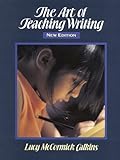The art of teaching writing / Lucy McCormick Calkins.
Material type: TextPublication details: Portsmouth, N.H. : Heinemann, 1994.Edition: New edDescription: xii, 550 p. : ill. ; 24 cmISBN:
TextPublication details: Portsmouth, N.H. : Heinemann, 1994.Edition: New edDescription: xii, 550 p. : ill. ; 24 cmISBN: - 0435088173
- 9780435088170
- 0435088092 (pbk.)
- 9780435088095 (pbk.)
- 0772521166 (Irwin)
- 9780772521163 (Irwin)
- English language -- Composition and exercises
- Report writing -- Study and teaching
- Inglés -- Composición y ejercicios
- Educación primaria -- Planes de estudio
- 20150900
- Anglais (Langue) -- Composition et exercices -- Etude et enseignement (Primaire)
- Creation litteraire -- Etude et enseignement (Primaire)
- 808/.042/0712
- LB 1576 C155a 1994
| Item type | Current library | Home library | Collection | Shelving location | Call number | Vol info | Copy number | Status | Date due | Barcode |
|---|---|---|---|---|---|---|---|---|---|---|
 Libro
Libro
|
Biblioteca Juan Bosch | Biblioteca Juan Bosch | Humanidades | Humanidades (4to. Piso) | LB 1576 C155a 1994 (Browse shelf(Opens below)) | 1 | 1 | Available | 00000093116 |
Browsing Biblioteca Juan Bosch shelves, Shelving location: Humanidades (4to. Piso), Collection: Humanidades Close shelf browser (Hides shelf browser)

|

|

|

|

|

|

|
||
| LB 1576 B468l 2013 Leap write in! : adventures in creative writing to s-t-r-e-t-c-h & surprise your one-of-a-kind mind / | LB1576 B824e 1994 Evaluating children's writing : a handbook of communication choices for classroom teachers / | LB 1576 B882d 2009 Developing language and literacy 3-8 / | LB 1576 C155a 1994 The art of teaching writing / | LB 1576 C388l 1994 Literacy and the arts for the integrated classroom / | LB 1576 C473u 2011 Understanding English language variation in U.S. schools / | LB 1576 C967s 1995 6 + 1 traits of writing : the complete guide grades 3 and up / |
Includes bibliographical references (p. 541-547).
I. The essentials off writing. Making meaning on the page and in our lives -- Tap the energy for writing -- Rehearsal : living the writerly life -- Drafting and revision : lettering our words instruct and surprise us -- II. Let children show us how to teach. Lessons from children -- The foundations of literacy : writing in the home -- The nursery school, and the kindergarten -- Growing up writing : grades K, 1, and 2 -- In between grades : Grades 2 and 3 -- Developing learning communities in the upper elementary grades -- Teaching adolescents : improvisation and commitment -- III. Ongoing structures in the writing workshop. Establish a predicable workshop environment -- Don't be afraid to teach tools to help us create mini-lessons -- Conferring : writing becomes a tool for thought -- Learning to confer -- Writing literature under the influence of literature -- Publication : the beginning of the writerly life -- Apprenticeships in the writing workshop : learning from authors -- Editing : learning the conventions of written language -- Assessment : a minds-on approach to teaching -- Workshop teaching throughout the day -- IV. The changing curriculum in the writing workshop. Developing a curriculum for writing students -- Genre studies -- Poetry : it begins in delight and ends in wisdom -- Making memoir out of the pieces of our lives -- Literary nonfiction -- Theme studies : reading the world, reading the word -- V. Writing workshop teaching in a larger context. Writing to learn throughout the day -- The home-school connection : composing literate lives in homes and neighborhoods -- Do I dare to care so much?
The Art of Teaching Writing, New Edition, has major new chapters on assessment, thematic studies, writing throughout the day, reading/writing relationships, publication, curriculum development, nonfiction writing and home/school connections. Annotation. When Lucy Calkins wrote the first edition of The Art of Teaching Writing, the writing workshop was a fledgling idea, piloted by a few brave innovators. Now, as she brings us this new edition, the writing workshop is at the foundation of language arts education throughout the English-speaking world. This new edition, then, could easily have been a restatement, in grander, more confident tones, of the original classic. Instead, it is an almost entirely new book. Clearly, during the time in which Calkins' original ideas have spread like wildlife, her focus has not been on articulating and defending those ideas, but on developing and rethinking them. Respecting and responding to the questions that have arisen as thousands of teachers establish writing workshops in their classrooms, and drawing upon the latest knowledge in the field and her own intimate understanding of classroom life, Calkins has re-thought every line and every facet of her original text. In this new edition, Lucy has major new chapters on assessment, thematic studies, writing throughout the day, reading-writing relationships, publication, curriculum development, non-fiction writing and home/school connections.


There are no comments on this title.